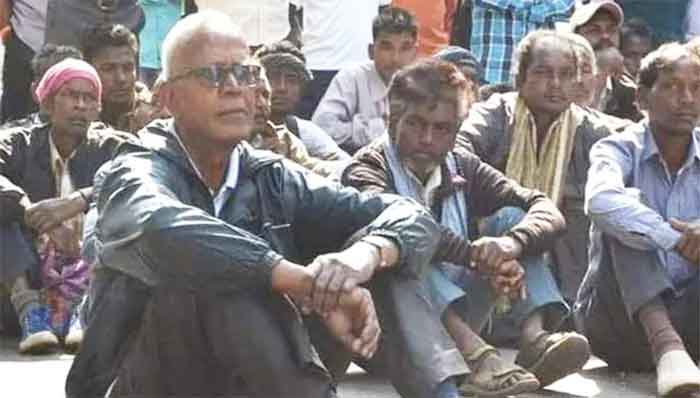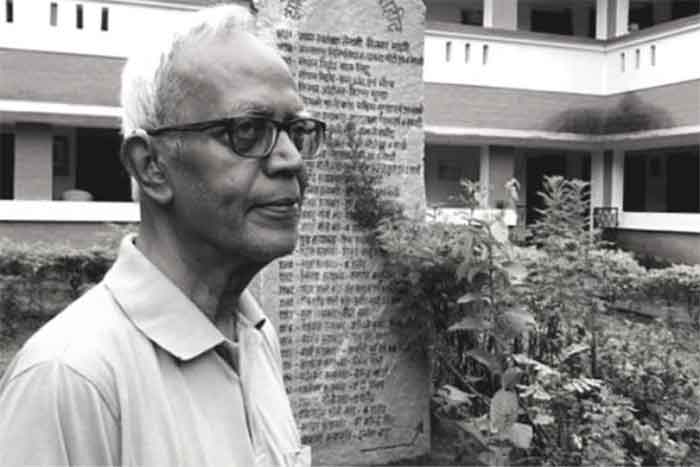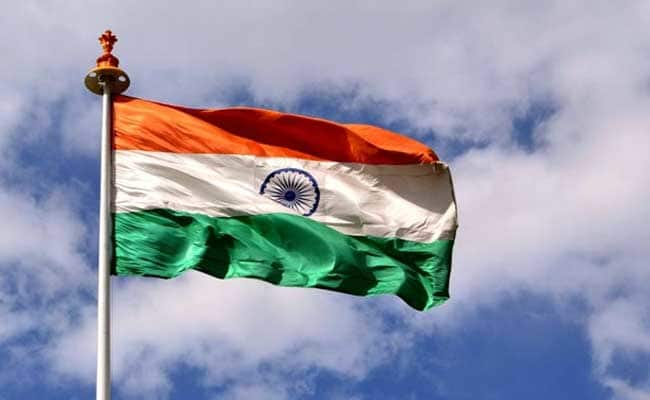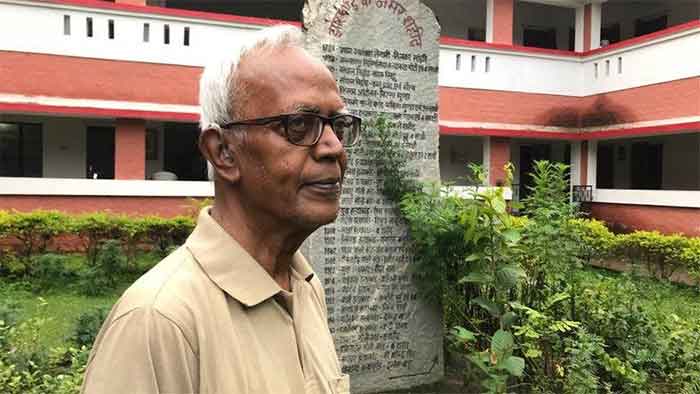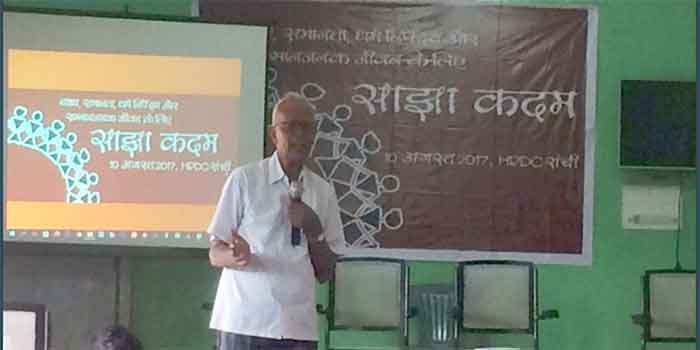
In the death of Fr Stan Swamy on July 5, 2021, who was an “under trial” detainee languishing in the custody of the authorities, India has lost a courageous campaigner for adivasi rights. The manner in which the 84-year old Jesuit priest was forced to die has shaken the conscience of the nation. What hurts the feelings of any one with a true sense of justice is that the authorities had callously watched his deteriorating medical condition, made no effort to speed up his trial and forced him to prove his innocence in death. The manner in which he was coerced to die will remain forever a blot on the track record of human rights in India.
Fr Stan Swamy was charged with sedition. What was the crime he had committed to deserve it?
He tried to answer this in a note he had recorded, which was published on July 31, 2018 (https://thewire.in/rights/pathalgadi-movement-adivasis-stan-swamy-sedition), soon after the then Jharkhand authorities first filed a case of sedition against him for supporting the adivasi Pathalgadi movement. Those sedition charges were revoked later when the present government in Jharkhand came to power. He was subsequently implicated in the so-called Elgar Parishad case and was arrested on October 8, 2020. To arrest human rights activists and then force them to languish in jails without a speedy trial seems to be the order of the day! Instead of feeling concerned about human rights violations brought to their notice by the civil society activists and addressing the same in line with the law of the land, as any civilised democratic government should, the authorities seem to betray their own true intentions by incarcerating, humiliating and intimidating those very same human rights messengers.
Democracies can survive only when they respect the rule of law. The questions posed by Stan Swamy in the above mentioned note primarily revolve around this premise with special reference to the Constitutional rights of the adivasis and the special laws applicable to them.
He questioned as to why the government had not enforced the special Constitutional rights of the adivasis as laid down in Article 244(1) and the Fifth Schedule and why they had reduced the Tribes Advisory Councils (TACs) to the status of “toothless” bodies. He referred to the land mark judgement of the apex court in the Samatha Case that private companies should not be allowed to mine in the Scheduled Areas and questioned as to why the rulers had not cared to comply with it. He questioned as to why the successive governments had failed to enforce the provisions of the two special laws applicable to the Scheduled Areas, namely, the Panchayat (Extension to the Scheduled Areas) Act (PESA) and the Scheduled Tribes and Other Traditional Forest Dwellers (Recognition of Forest Rights) Act (FRA), which empowered the adivasi Gram Sabhas in decision making on all matters relating to the welfare and the development of the tribals, including mining. He further questioned as to why the then Jharkhand government introduced a regressive amendment to the otherwise progressive Central law on land acquisition, namely, the Right to Fair Compensation and Transparency in Land Acquisition, Rehabilitation and Resettlement Act of 2013. The amendment exempted projects from being subject to “social impact assessment” and “prior consent” of the affected people, the two progressive components of the 2013 law.
He supported the Pathalgadi movement of the tribals in Jharkhand, as these were the very same concerns that the adivasis taking part in the movement had also raised. He referred to the definition of “sedition” as laid down by the apex court in several cases, which suggested that no sedition charges could be levelled against anyone who did not incite violence. Merely asking the right questions on non-compliance with the law of the land cannot be construed as sedition. Should those who question the non- enforcement of Article 244(1) and the Fifth Schedule to the Constitution and the special laws enacted for the adivasis be branded as “deshdrohis”? “If this makes me a deshdrohi then so be it!” were his concluding words. They speak volumes about the utter apathy displayed by the governments, irrespective of their political affiliation, towards the well-being of the adivasis in the country.
What distresses anyone, who has a reasonable appreciation of the Fifth Schedule and the special laws that exist for empowering the adivasis, is the continuing non- compliance with the same by those who are required to enforce them. What causes a deeper anguish is the inexplicable silence on the part of the institutions that exist to safeguard the adivasis’ rights under the Constitution and their inaction in protecting those who take up the cause of the adivasis. Those institutions which are statutorily equipped to intervene suo motu in such situations, for reasons best known to them, have not acted as they should.
Why should the authorities so casually brand the adivasi rights activists “deshdrohis”? There are compelling reasons for this.
The paradigm of “development”, adopted by the ruling elite, irrespective of their political hue, includes indiscriminate exploitation of the scarce mineral resources of the country, which are largely located in the Scheduled Areas. The same model of development also envisages a predominant role for the large corporate businesses in the mining activity. It is not uncommon for the political parties to depend on corporate donations, for which the successive governments have conveniently amended the Companies Act to permit such donations. Mineral extraction is an activity that necessarily disturbs the habitat of the adivasis, disrupts the ecology on which they critically depend and brings about demographic changes adverse to their interests. Strictly, both the PESA and the FRA require the adivasi Gram Sabhas to have a say in decisions on mining, whereas, the model of “development” in vogue envisages unilateral imposition of such decisions from the top. As a result, decisions on mining, largely driven by the large private companies, are taken in violation of the PESA and the FRA, depriving the adivasis of the rights given to them by the Constitution. The TAC which is a Constitutional body meant to represent the adivasis’ interests, has been rendered “toothless” and therefore the adivasis have no alternative other than to agitate collectively in order to bring pressure on the political system. They take help from the local activists who understand their feelings and whom they trust. The activists are therefore branded as “anti-development”, a term often considered equivalent to “anti-national”, because they question the nexus between the ruling elite and the private companies. There are draconian laws and concepts that India has inherited from the colonial era to suppress resistance in the name of sedition, which have come in handy for the ruling elite to neutralise opposition. The agencies that investigate these so-called “sedition” cases have also been rendered pliable and ineffective, so that they may help the ruling elite in intimidating the dissenters and gagging their voice for making way for doling out the mineral resources to the private companies.
Independent India is a democracy which should function on the basis of a set of laws and regulations meant to uphold the national interest and promote the welfare of the people. It should ensure transparency and participative decision making in governance. Can such a democracy survive for long, when well reasoned and people- oriented dissent is frowned upon and the dissenters are jailed without trial? The irony of this is that those in power who are in non-compliance with the law of the land go scot-free and those who seek compliance with the law of the land are treated as anti- national.
For example, there were fiery speeches made by some senior political leaders, including those in responsible positions in the government ((https://youtu.be/MDQYanaVApE)), preceding the Delhi riots that took place in February 2020. The riots, which were perhaps the ugliest in the recent history of Delhi, lasted for around ten days. There was violence all around resulting in 53 deaths and injuries to 200 persons. The authorities should have filed cases against those who incited violence but they desisted from doing so because those who were involved had indirect support from the government. On the other hand, for similar alleged offences during the same Delhi riots, scores of ordinary citizens including well known, highly respected activists were booked for offences they never committed.
It is helpful to review the special provisions that exist in the Constitution for empowering the tribals, that Stan Swamy had referred in his note mentioned above.
Article 244(1) and the Fifth Schedule confer a special status on the tribals in the “Scheduled Areas”, which are areas notified as such under that Schedule. The President of India and the Governor of the State are the custodians of administration in the Scheduled Areas. Clause 4 of the Schedule provides for a “Tribes Advisory Council (TAC)”, “to advise on such matters pertaining to the welfare and advancement of the Scheduled Tribes in the State as may be referred to them by the Governor”. Clause 5 of the Schedule recognises the special way of life of the adivasis and permits the Governor to adapt all or any of the laws to suit the adivasis’ interests or even exclude their application to the Scheduled Areas, if considered desirable for safeguarding the interests of the adivasis. In particular, Clause 5(2) permits the Governor to prohibit the transfer of land to non-tribals and prohibit money-lending by non-tribals in the Scheduled Areas. The Centre and the concerned States have enacted laws in line with the above Constitutional provisions.
There are special laws enacted by the Centre for the Scheduled Areas, more prominent among them being the Panchayat (Extension to the Scheduled Areas) Act (PESA) and the Scheduled Tribes and Other Traditional Forest Dwellers (Recognition of Forest Rights) Act (FRA). The core concept underlying these laws is the preeminent status given to the local Gram Sabhas in decision making in all activities that impinge on the adivasis’ lives, including conferment of occupation rights for them in the forest lands where they have enjoyed occupation for generations. Such occupation rights accrue not only to individual adivasi cultivators but also to adivasi village communities who depend on the common natural resources around them.
The State laws relate to prohibition of land alienation to non-tribals and money lending by them.
In several cases, the Supreme Court has time and again reinforced the validity of these Constitutional and legislative provisions. Prominent among them are the Samatha case on prohibition of mining by non-tribals and private companies in the Scheduled Areas and the Orissa Mining Corporation case on the role of the adivasi Gram Sabhas in the Scheduled Areas in decision making on mining activity.
In Samatha vs State Of Andhra Pradesh And Ors, the apex court held on 11 July, 1997 that “the constitutional and legislative intention (is) that tribals and a Cooperative Society consisting solely of tribal members alone should be in possession and enjoyment of the land in the Scheduled Area”, thereby prohibiting alienation of land and mining by non-tribals and private companies. In this judgement, the apex court also emphasised the role of the TAC in advising the State Governor on all matters concerning the welfare and development of the adivasis.
In Orissa Mining Corporation Ltd vs Ministry Of Environment & Forest, the apex court, in their judgement of 18 April, 2013, emphasised the pivotal role of the Gram Sabhas in the Scheduled Areas in decisions on mining, as envisaged in the PESA and the FRA. Particularly, the apex court, instead of accepting the State’s contention that the authorities had obtained the prior consent of the local Gram Sabhas as required under the PESA and the FRA, directed that the question of taking up mining on the Niamgiri Hill should be posed to the Gram Sabhas in the affected villages as per the prescribed procedure in the presence of an independent judicial officer to ascertain the Gram Sabhas’ considered views on mining. When these directions of the apex court were implemented, the local Gram Sabhas rejected the idea of bauxite mining as it would disrupt their lives. It shows how the authorities, in the first instance, produced contrived Gram Sabha resolutions to clear the way for the private company to take up mining. Timely judicial intervention frustrated their attempt to benefit the company.
The manner in which the authorities have chosen to violate the special laws applicable to the Scheduled Areas can be readily illustrated by considering two recent cases.
The Polavaram irrigation project, which is under construction as a “national project” in AP across the Godavari River at a huge cost, has caused displacement of around 100,000 people, mostly adivasis in the Scheduled Areas. As vouched by the Union Tribal Affairs Ministry to the Rajya Sabha on 3-8-2016, the displaced families had not been granted occupation rights under the FRA, a position that has not altered till date. Still, both the Centre and the State continue to incur expenditure and release funds to the contractors, without caring to enforce the FRA provisions. It is the local adivasis that stand deprived of what is due to them.
The Union Ministry of Coal issued a notification on June 18, 2020 (http://www.coal.nic.in/) calling for bids for mining around 40 coal blocks, many of which are located in the Scheduled Areas. According to the apex court’s directions referred above, the decision to mine coal should, in the first instance, be taken by the concerned adivasi Gram Sabhas, as envisaged in the PESA and the FRA. As against this, it was the Centre that took a unilateral decision to auction the coal blocks, prima facie in violation of the letter and the spirit of both the Central Acts, to the detriment of the local adivasis’ interests.
In either of the two examples cited above, how can one expect the adivasis to stand up against the might of the State and approach the courts for relief? If an individual activist or a civil society body, working in those areas, seeks justice for the adivasis, should they be considered “anti-national” and subject to harassment as in the case of Stan Swamy?
In September, 1949, when Dr B R Ambedkar moved the draft Fifth Schedule for approval, there was an elaborate clause-by-clause discussion in the Constituent Assembly. The Fifth Schedule that has since become a part of the Constitution is the outcome of such an enlightened deliberation among the elders who gave a final shape to the Constitution as it stands today. It is ironic that more than seven decades after that, those who have come to power through the democratic processes provided in the Constitution should so callously ignore and violate the provisions of the very same document that has placed them in authority. It is all the more ironic that those who are seeking to get the Constitutional provisions in the Fifth Schedule enforced should be treated as “anti-national” and consigned to jails without a proper trial. Had Dr Ambedkar been alive to witness this today, he would have expressed his deep anguish at the way the elected leaders are frustrating the noble intentions underlying the Fifth Schedule.
Should a nation that prides itself on having a “vibrant” democracy continue to acquiesce in those in authority misusing their democratic mandate and violating the law of the land at the cost of the adivasis? Indiscriminate mining of any scarce mineral has long-term adverse environmental implications including a reduction in the water flows in the river catchments and polluting the water that feeds the rivers. Most mineral extraction activity in the country violates the environment laws, in addition to violating the laws meant for the adivasis. To what extent the summary decisions taken by the government to allow such indiscriminate mining serve the long-term national interest?
Stan Swamy is no more but who will answer the questions that he had raised on behalf of the adivasis? Many activists like Stan Swamy face similar harassment from the authorities in several States. One wonders whether they will ever get protection from those institutions that exist to provide such protection.
Stan Swamy’s questions are valid today in respect of the Scheduled Areas not only in Jharkhand but in all other States where they are located. Every adivasi in this country has been asking the same questions again and again, without satisfactory answers coming from the authorities and without any action to implement the special statutory provisions that exist for the adivasis. Who will come to the rescue of the adivasis and ensure that their Constitutional rights are restored and fully safeguarded?
E A S Sarma, Former Commissioner for Tribal Welfare in AP, Former Secretary to Government of India
GET COUNTERCURRENTS DAILY NEWSLETTER STRAIGHT TO YOUR INBOX

